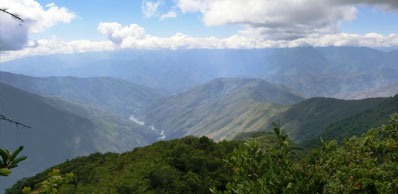From Cusco we'll take a private van through Ollantaytambo and up to the Panticalla Pass at 4437m/14558ft where we begin a biking descent from above the treeline at the Ocobamba River headwaters down through subtropical high jungle along the Ocobamba Valley to the lower jungles of the Yanatile Valley before switching over to packrating the Urubamba River to Kiteni.
Duration
Difficulty
Max Elev
Min Elev
Elev Change
Raft Dist
Rapids Class
Rafting Duration
River Speed
Biking Distance
Bike/Raft Chgs
River Water
Bugs?
4-5D
2-3 of 5
4437m/14558ft
580m/1900ft
3857m/12658ft
68km/42mi
1-2+
6-7hrs+
6-16kph/4-10mph
120km/74mi
1-2
Clear
No/Yes
Day 1 Cusco - Ollantaytambo - Panticalla Pass - Ocobamba Valley - Riverside Camp
From Cusco we'll take an early private van through Ollantaytambo and up through Patacancha to the Panticalla Pass at 4437m/14558ft where we begin downhill biking on dirt roads and some singletracks. We begin in the highlands more than 3000ft above Cusco where it's cold and foggy with rewarding views of snow-capped peaks. From there we descend into cloud forest where the vegetation becomes greener with views of waterfalls and high jungle scrub. We'll bike down 3-4 hrs before we pick a suitable campsite next to the Ocobamba River. Night hammock camping.
Day 2 Yanatile Valley - Quellouno - Urubamba River - Riverside Camp
This morning we'll raft the remaining 3-4 hrs down on small roads and singletracks reaching the Yanatile Valley then west along the Yanatile River where it meets the Urubamba River (Machu Picchu river) at the town of Quellouno. We can have lunch in town before we continue down to the river's edge where we will strap our bikes to our rafts for bikerafting subtropical forest down towards more tropical jungle surroundings. In the afternoon we'll pick out some trees to set up camp just up from the Urubamba River. Night hammock camping.
Day 3-5 Urubamba River - Kiteni - Night in hostal
We'll continue packrafting down the lower Urubamba River a total of 68km/42mi reaching the town Kiteni at 580m/1900ft around lunchtime to afternoon. We'll have the rest of the day to explore this town, check into a local hostal and arrange for the next day's return transfer. Night in hostal. The following day we'll take an early bus from Kiteni to Quillabamba followed by another bus to Cusco arriving late at night.
 Ocobamba Valley
Ocobamba Valley
Cost Estimates
A private van transfer to the beginning of our trip will be shared by the group. A hostal in Kiteni should cost from S/20-40 soles per night. Food purchased at Peruvian supermarkets can be about $10 per day. Return bus transportation typically ranges from S/30-40 Soles per bus (2 buses total). There are no entrance fees for this trip. There are no fees for our agency for any of these expeditionary trips, no guide fees and also no guarantees on return times, points of interest or the assurance of any planned activities.
Gear
You will need to provide your own gear for this trip including bike, bags, packraft, PFD, paddles, bug hammock, tarp, sleeping bag, cook kit and food. In the case that you cannot provide your own equipment contact us for options.
Risks
The Urubamba River from Quellouno down is wide and at a class 1-2+ during the dry season. This trip should not be attempted during rainy season (Dec - March) when rain and water levels can become unpredictable. The ideal time for this route is from May 15th - Nov 15th when the river is tame and the bike route is drier and less cumbersome. We have a lot of road and track to cover so protective biking equipment is best. At campsites or during any additional hiking trips there can be plants with thorns. The real potential dangers are people hurting themselves with their own machetes, falling on uneven ground, ant bites, mosquito bites, allergic reactions etc. In most cases it may take days to reach the nearest clinic or "Centro de Salud" for any needed medical attention. We offer no guarantees for any of these expeditions for planned activites, definite costs or for your absolute safety.
Options
It's up to the group whether we'd like to spend more time in either the Ocobamba and Yanatile valleys. This could mean we bike or raft for less at a time and enjoy more of the campsites and possible short hikes in each area. It is possible to continue rafting past Kiteni and further down to Pongo de Mainique with a return biking trip back to Kiteni. This would require additional, mutliple days. A visit to Machu Picchu would naturally follow this route. From Kiteni the bus would drop you at Santa Maria where it's possible to bike or take a car south to Santa Teresa and further down to Hidroelectrica and to Machu Picchu.